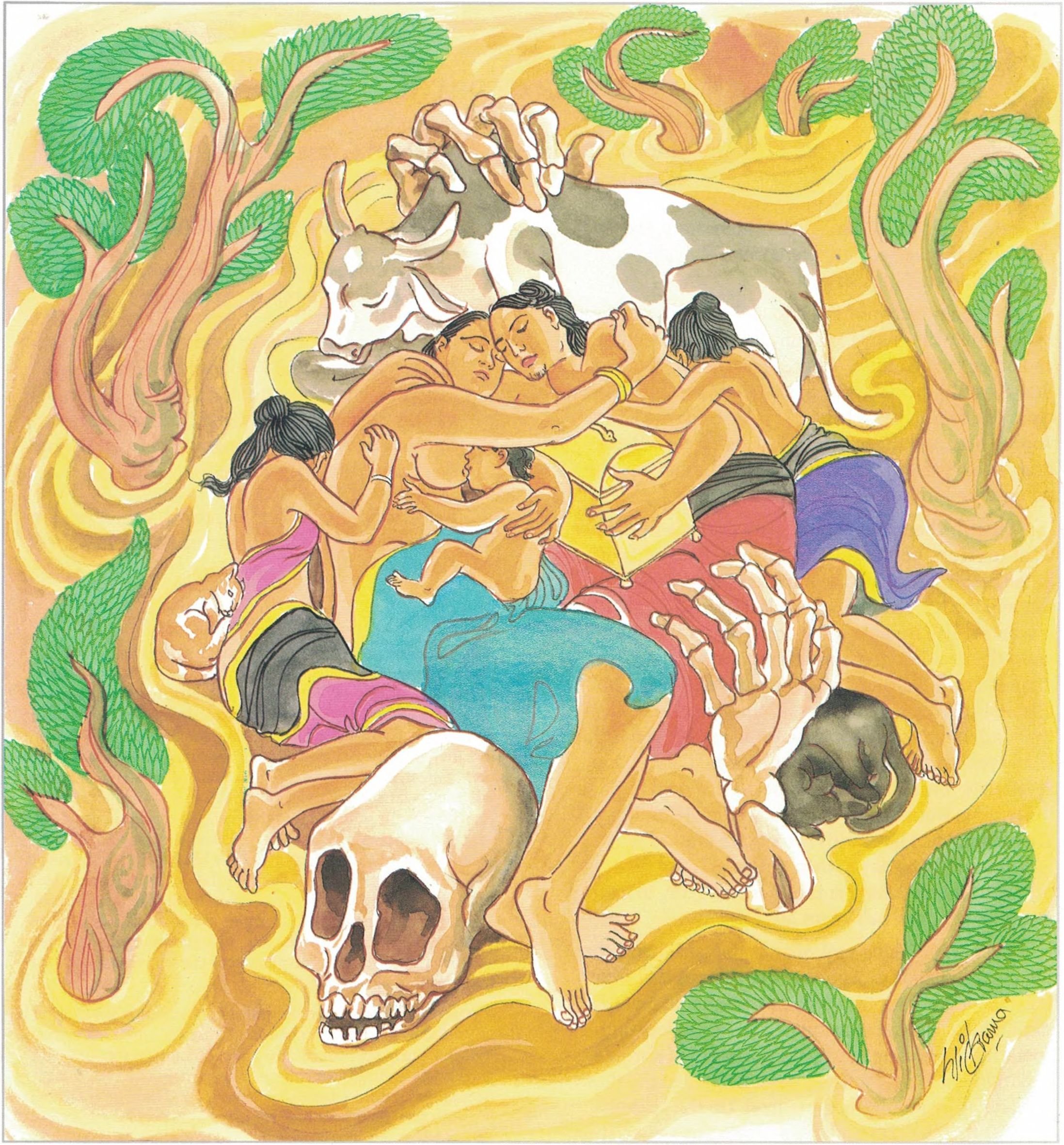Dhammapada (Illustrated)
by Ven. Weagoda Sarada Maha Thero | 1993 | 341,201 words | ISBN-10: 9810049382 | ISBN-13: 9789810049386
This page describes The Story of Kisagotami which is verse 287 of the English translation of the Dhammapada which forms a part of the Sutta Pitaka of the Buddhist canon of literature. Presenting the fundamental basics of the Buddhist way of life, the Dhammapada is a collection of 423 stanzas. This verse 287 is part of the Magga Vagga (The Path) and the moral of the story is “Man dotes on children and wealth. But death sweeps him like a flood a sleeping village”.
Verse 287 - The Story of Kisāgotamī
Pali text, illustration and English translation of Dhammapada verse 287:
taṃ puttapasusammattaṃ byāsattamanasaṃ naraṃ |
suttaṃ gāmaṃ mahogho'va maccu ādāya gacchati || 287 ||
287. For one who has a clinging mind and finds delight in babes and herds Death does seize and carry away as great flood a sleeping village.
 Man dotes on children and wealth. But death sweeps him like a flood a sleeping village. |
The Story of Kisāgotamī
While residing at the Jetavana Monastery, the Buddha spoke this verse with reference to Kisāgotami, the daughter of a rich man from Sāvatthi.
Kisāgotami came to the Buddha as she was stricken with grief due to the death of her only son. To her the Buddha said, “Vainly you imagine that you alone had lost a child. But this is an eternal law for all beings. For death, like to a raging torrent, drags along and flings into the sea of ruin all living beings; still are their longings unfulfilled.” At the end of the discourse, Kisāgotami attained sotāpatti fruition.
Explanatory Translation (Verse 287)
puttapasusammattaṃ byāsattamanasaṃ taṃ naraṃ
suttaṃ gāmaṃ mahogho iva maccu ādāya gacchati
puttapasusammattaṃ [puttapasusammatta]: intoxicated with the possessions of children, cattle, etc. byāsattamanasaṃ [byāsattamanasa]: with a mind overwhelmed; taṃ naraṃ [nara]: that person; suttaṃ gāmaṃ [gāma]: sleeping village; mahogho iva: like a great flood; maccu: the Death; ādāya gacchati: takes him along (in the flood)
Men are proud that they possess children, cattle and other forms of wealth. They tend to be proud that way because their minds are overwhelmed by blemishes. Floods sweep away a sleeping village, taking along all its people and their possessions. In the same way, death comes unawares and sweeps along the people however proud they are of their possessions.
Commentary and exegetical material (Verse 287)
Kisāgotami was foremost among the female Mahā arahats of the noble Sangha, for the ability to wear rough robes. We first come across her during the dispensation of Padumuttara Buddha. She saw her like and immediately resolved to follow her in her footsteps. She gave alms, and practiced meditation. She was born in deva realms. She was born in this dispensation in a rich family. She duly married. But people took no notice of her. She was lean and hence she was called Kisā. Hence, her own name Gotamī was linked with Kisā and was known as Kisāgotami. When a son was born to her she became popular. As soon as the child came to an endurable age he died.
The prop on which she was leaning was suddenly removed. Attachment made her blind. She could not believe he was dead. So, with the dead child in her arms she roamed for a medicine for his recovery. She was laughed and scorned at. She was agitated beyond measure. She was nearly going mad.
One day, a good samaritan pointed the way to Jetavanārāma, where the Buddha was residing. When she went, the Buddha was discoursing to the monks and she stood at the end of the hall and entreated the Lord for the medicine that she had hitherto sought in vain. The Buddha saw her future. The Buddha saw that she was a stranger to death. So the Buddha asked her to bring some mustard seed. She felt that her child would recover soon and was about to set forth for the mustard. “But tarry a little,” the Buddha added, “that mustard seed must be brought from a house, meaning clan, that has not tasted death.”
However, she thought it was simple enough. But she was on a voyage of discovery. Once again, the spectacle of the distraught mother with the corpse of the child in her arms was parading in the streets of Srāvasti. The much sought after mustard was readily available in every home perhaps but alas! not the particular seeds the Buddha wanted. There was no visitor so frequent as death. The truth gradually dawned on her about the universality of death. The force of death overwhelmed her. She saw that the Buddha wanted to teach her the great lesson. She hurriedly took the corpse to the cemetery and kept it there remarking that he was not the only child to die. Her practice of meditation in the past came to her rescue. It was not difficult for her to realize that nothing endures forever. It was so in all planes of life, including the brahma world. Only an arahat passes away completely, never to be born again or to die again. She glimpsed that bliss. She returned a sadder and wiser woman. She no longer sought the medicine. She yearned for the higher prescription that would cure her once and for all.
She begged of the great physician to minister to her mind’s disease. The Buddha’s diagnosis was incomparable. The Buddha preached. There were four powerful currents (ogā) that would hurl mortals to and fro in the ocean of saṃsāra.
The four currents are:
- carnal pleasures (kāma);
- clinging to existence (bhava);
- attachment to various wrong beliefs (diṭṭhi);
- ignorance (avijjā).
Kisāgotami grasped the truth which ordinary mortals fail to understand. The Buddha further acknowledged that a person who lives realizing the supreme bliss even for one day was nobler by far than one who lives a century blinded by ignorance.
